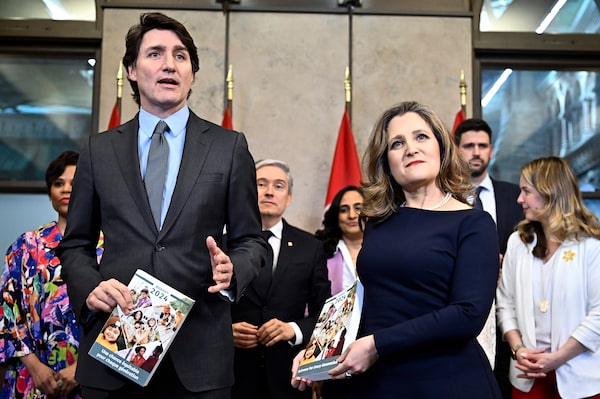
Prime Minister Justin Trudeau, Finance Minister Chrystia Freeland and cabinet ministers speak before tabling of the federal budget on Parliament Hill in Ottawa, on April 16.Justin Tang/The Canadian Press
For nearly a decade, the Liberals have been a borrow-and-spend government, going so far as to preach the absolute virtue of debt financing.
But the party of borrow and spend is no more, with the government venturing in the 2024 budget that “it would be irresponsible and unfair to pass on more debt to the next generations.”
Unfortunately for Canadians, the upshot of that thought is not a move to restrain federal spending in order to limit the rise in debt.
Instead, Ottawa’s spending spree will continue – but will now be financed with hefty new taxes, totalling $21.9-billion over five years.
The borrow-and-spend Liberals have been replaced by the tax-and-spend Liberals.
In a very limited way, that is good news: the Liberals will hit the fiscal marks that Finance Minister Chrystia Freeland promised last year in the Fall Economic Statement. Tax increases will offset some of the inflationary impact of higher federal spending. Even so, debt charges are forecast to rise to $64.3-billion by fiscal 2029, up from $35-billion in fiscal 2023, as the outlook for interest rates ticks up. That trend underscores the fiscal dangers lurking later this decade.
More broadly, Canada faces a productivity crisis (although that is not among the many crises enumerated in the budget) that threatens to erode this country’s living standards and erase the hopes for a more prosperous future. In fairness, the budget does sound the alarm over Canada’s prosperity problem: “Looking forward, we have an urgent need to increase productivity to grow the Canadian economy.”
The Liberals then proceed to attempt to ignore those concerns. The recent decline in GDP per capita? That is a temporary phenomenon, driven by a surge in immigration, that will fade as newcomers integrate into the Canadian economy, the budget ventures. An interesting thesis – and one at least partly at odds with the government’s plan to ramp up permanent immigration this decade.
Acknowledging the extent of the problem would require doing something about it: reducing regulatory barriers to investment, bolstering the profit incentive for private investment and loosening Ottawa’s grip on the economy.
The Liberals head in the opposite direction, in the name of “fairness.” Program spending is slated to rise to 16 per cent of GDP in the current fiscal year, up from 15.6 per cent last year.
There are no broad-based tax cuts, but rather a significant increase in the taxation of capital gains, by boosting the inclusion rate to two-thirds, up from 50 per cent, for gains above $250,000. Those higher taxes are only slightly offset by boutique tax credits and investment incentives, yet another way for the government to intervene in the market economy.
The program allowing for accelerated capital cost allowances for corporations is still being phased out, even as a program targeted at information-technology expenditures is introduced. Too bad if a company’s plan for boosting profits, productivity and pay doesn’t centre on computers. Similarly, there is favourable tax treatment for entrepreneurs’ capital gains – but only in favoured sectors.
And yet, there are nuggets within the federal budget that could have been the start of an ambitious agenda to jump-start the Canadian economy.
The information-technology tax break could be a good start to spurring an investment surge. The government is, wisely, taking aim at the lengthy process for regulatory approvals for major projects. Returning fuel charge revenue to small businesses, while long overdue, is preferable to an overly intricate grants program.
There are hints of what a push to roll back the public sector might look like: Ottawa will sell off a big chunk of its office space. The public service will shrink through attrition (although not by nearly enough to offset the hiring spree under the Trudeau government). Most intriguingly, the Liberals are opening the door to private sector investment in airports, which would be an elegant response to the calls to boost pension fund investment in Canada.
That could have been the nucleus of a pro-growth budget, one that would have been far less worried about income redistribution and much more concerned about creating wealth in the first place.
Fairness is a fine thing, but all the fairness in the world won’t fix Canada’s prosperity problem.